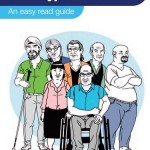
Alison Turner blogs about a new telehealth toolkit from the NHS Commissioning Assembly, which provides a range of resources including checklists, case studies and links to the evidence base.
[read the full story...]
Alison Turner blogs about a new telehealth toolkit from the NHS Commissioning Assembly, which provides a range of resources including checklists, case studies and links to the evidence base.
[read the full story...]
People with learning disabilities may be at higher risk of developing type 2 diabetes, but often struggle with technical language and complicated explanations. Here we look at a new easy read booklet published as part of an ongoing research project into diabetes people with learning disabilities.
[read the full story...]
Maxine Howard summarises the findings of a recent review of online mental health services for young people, which finds little evidence to suggest that websites increase help-seeking in adolescents.
[read the full story...]
This guide is the result of discussions with health professionals and people with diabetes Types 1 and 2, and surveys investigating the levels of service provision in London. The reason for this work is because people with from diabetes often suffer from mental health issues, such as depression, anxiety, phobias, adjustment to their condition, eating [read the full story…]

Laurence Palfreyman highlights an RCT of the DECIDE intervention, which aims to build awareness of the service user’s role in decisions about their care including how they can become more involved and seek information from independent sources.
[read the full story...]
While it is predicted that depression will achieve the status of the biggest disease burden in the Western World before too long, providing access to evidence-based clinical interventions (medicines and talking treatments) for this growing number of people is a source of concern. Supporting people to take steps to actively self-manage their symptoms and condition [read the full story…]

Temporomandibular disorders (TMD) are a group of disorders with symptoms that include pain, clicking, grating in the jaw joint and/or problems chewing or opening the jaw. It has been estimated that around 75% of the population have at least one sign of TMD. The aim of this review was to assess the effectiveness of counselling [read the full story…]

About three-quarters of people with dementia are affected by neuropsychiatric symptoms (NPS). This is a broad group of symptoms including depression, sleep problems, apathy, psychosis and aggression. Of course, many people with dementia still live at home and are cared for by their spouse or other primary carer. These neuropsychiatric symptoms can have a major impact [read the full story…]

Chronic pain is a major health concern, which increases in prevalence and impact with age. This is important as chronic pain can result in a significant decrease in function and quality of life along with an increase in use of health and social care. Self-management is a potentially inexpensive form of pain management and it [read the full story…]

This week in Scotland has been designated as self-management week. There is a growing awareness that low back pain (LBP) is a long term condition and that self-management can decrease the burden of this, and many other, conditions. To date, self-management has been described as a model of care where patients use strategies to manage and monitor [read the full story…]